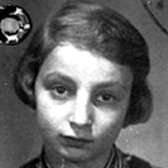
-
Learn More about Inge
Inge Berg was born on March 27, 1929 in Cologne, Germany to Klara and Josef Berg. The Bergs, a close-knit observant Jewish family, lived with Josef’s parents, and their family was active in the local Jewish community; Inge’s paternal grandfather was president of the local synagogue association, and her father’s brother, George, was the synagogue’s cantor. Josef was a cattle dealer and Klara managed the household and raised her daughters Inge and Gisella (Jill), born in 1933.
After the Nazis came to power in 1933, the Bergs felt the immediate effect of increased antisemitic legislation. Inge was no longer allowed to attend public school and traveled 18 miles by train every day to attend the Jewish school in Cologne, Germany. Josef was forced to give up his business, although a non-Jewish family friend managed it in his stead. In November 1938, the Bergs fled to Cologne to escape Kristallnacht. Unfortunately, their home and numerous possessions were damaged or destroyed. Josef hoped to avoid imprisonment and forced labor in the aftermath of Kristallnacht by fleeing to Holland, but was unsuccessful. He, his brother George, and their cousin Ernst were arrested for illegal entry and detained for six months in an internment camp in Roemond, Holland. Following their release in the spring of 1939, Josef, George, and Ernst left Germany for Kenya, British East Africa. Through a cousin’s law firm in Nairobi, arrangements were made for the entire Berg family’s immigration. In May 1939, Inge, Jill and their mother sailed for Mombasa on the SS Usambara.
When Britain declared war on Germany in September 1939, the Bergs were labeled “enemy aliens.” As a result, Inge found it difficult to make friends and spent the majority of her time with her paternal grandparents. For the next eight years, the Bergs raised cattle and pyrethrum, a flowering plant used to make insecticide, on their 375-acre farm in Limuru, a small town approximately 17 miles northwest of Nairobi. The house offered spectacular views of Mount Kenya and Mount Kilimanjaro; however, conditions were quite rustic. The house boasted a tin roof and cement floors with rain as their only water source. Inge continued her formal education in Nairobi and, despite being 10 years old, was placed in the first grade because she could not speak, read, or write English. She quickly mastered the language, however, and was able to advance to the fourth grade. Meanwhile, Klara ran a guesthouse that became a popular destination for British-Jewish soldiers on furlough.
In 1947, the Bergs immigrated to the United States where Klara and Josef purchased a chicken farm and dairy business in Vineland, New Jersey, and Inge took a position with an attorney’s office in New York City. In 1951, she met and married Werner Katzenstein, a fellow refugee from Nazi Germany. They have three children. Inge retired from Coldwell-Banker Real Estate after thirty-five years. She and Werner, along with Jill and her husband, Kurt Pauly, a fellow Holocaust survivor, volunteer at the United States Holocaust Memorial Museum.






